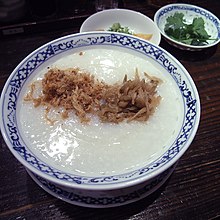
Back عصيدة الأرز Arabic কঞ্জি Bengali/Bangla Arròs congee Catalan Cé̤ṳk CDO Reis-Congee German Arroz congee Spanish شله Persian Congee French 粥 GAN Csuk Hungarian
This article needs additional citations for verification. (April 2011) |
 | |
| Type | Porridge |
|---|---|
| Main ingredients | Rice |
Congee (/ˈkɒndʒiː/, derived from Tamil கஞ்சி [kaɲdʑi])[1][2][3] is a form of savoury rice porridge made by boiling rice in a large amount of water until the rice softens. Depending on rice–water ratio, the thickness of congee varies from a Western oatmeal porridge to a gruel. Since the history of rice cultivation in Asia stretches back to the Baiyue-inhabited lower Yangtze circa 10,000 BC,[4][5][6] congee is unlikely to have appeared before that date. Congee is typically served with side dishes, or it can be topped with meat, fish, and pickled vegetables.
Vivid experiences of eating or delivering thin congee as wartime or famine food often feature in diaries and chronicles.[7] In some cultures, congee is eaten primarily as a breakfast food or late supper; some may also eat it as a substitute for rice at other meals. It is often considered suitable for the sick as a mild, easily digestible food.[8]
- ^ "Definition of CONGEE". www.merriam-webster.com. 22 July 2023.
- ^ Yule, Henry, Sir (1903). Hobson-Jobson: A glossary of colloquial Anglo-Indian words and phrases, and of kindred terms, etymological, historical, geographical and discursive.
It is from the Tamil kanjī, 'boilings.'
{{cite book}}: CS1 maint: multiple names: authors list (link) - ^ Lim, Lisa (10 November 2017). "Where the word congee comes from – the answer may surprise you". Post Magazine. South China Morning Post. Retrieved 22 August 2021.
- ^ Lu, Tracey L-D (2006). "The Occurrence of Cereal Cultivation in China". Asian Perspectives. 45 (2): 129, 135, 138. doi:10.1353/asi.2006.0022. hdl:10125/17249. S2CID 162414736.
- ^ Grossa, Briana L.; Zhao, Zhijun (2014). "Archaeological and genetic insights into the origins of domesticated rice". Proceedings of the National Academy of Sciences of the United States of America. 111 (17): 6191. Bibcode:2014PNAS..111.6190G. doi:10.1073/pnas.1308942110. PMC 4035933. PMID 24753573.
- ^ Ma, Yongchao (2018). "Multiple indicators of rice remains and the process of rice domestication: A case study in the lower Yangtze River region, China". PLOS ONE. 13 (12): 2. Bibcode:2018PLoSO..1308104M. doi:10.1371/journal.pone.0208104. PMC 6277086. PMID 30507965.
- ^ 陳嘉遠 (July 2021). "一個愛國知識份子的流亡生涯——陳嘉遠先生日記(1950.9.1-9.30)". 黃花崗雜誌. No. 70–71. p. 65.
- ^ Robert Saunders (1789) "Boutan & Thibet", Philosophical Transactions of the Royal Society Vol. 79, p. 101